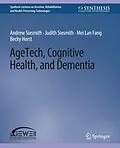This book explores the ways in which AgeTech can contribute to healthy cognitive aging and support the independence of people with dementia. Technology can play a key role in supporting the health, independence, and well-being of older adults, particularly as a response to rapid worldwide population aging. AgeTech refers to the use of technologies, such as information and communication technologies (ICTs), robotics, mobile technologies, artificial intelligence, ambient systems, and pervasive computing to drive technology-based innovation to benefit older adults. AgeTech has the potential to provide new ways of meeting the growing demands on health and social care services to support people to stay healthy and active. As such, AgeTech represents an increasingly important market sector within world economies. The book also addresses some of the research, innovation, and policy challenges that need to be resolved if technology-based products and services are to fulfill their potential and deliver real-world impacts to improve the lives of older adults and their carers, thus promoting more inclusive communities for the benefit of all.
Autorentext
Andrew Sixsmith, Ph.D. is the joint Scientific Director of AGE-WELL Network of Centres of Excellence (NCE), the Director of Simon Fraser University's (SFU) Science and Technology for Aging Research (STAR) Institute, and a professor in the Department of Gerontology at SFU. He is past President of the International Society of Gerontechnology and was previously Director of the Gerontology Research Centre and Deputy Director of the Interdisciplinary Research in the Mathematical and Computational Sciences (IRMACS) Centre at SFU. His research interests include technology for independent living, theories and methods in aging and understanding the innovation process. His work has involved him in a leadership and advisory role in numerous major international research projects and initiatives with academic, government, and industry partners. He received his doctorate from the University of London and was previously a lecturer at the University of Liverpool at the Institute of Human Ageing and Department of Primary Care.
